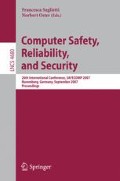Abstract
The advanced electric power grid promises a self-healing infrastructure using distributed, coordinated, power electronics control. One promising power electronics device, the Flexible AC Transmission System (FACTS), can modify power flow locally within a grid. Embedded computers within the FACTS devices, along with the links connecting them, form a communication and control network that can dynamically change the power grid to achieve higher dependability. The goal is to reroute power in the event of transmission line failure. Such a system, over a widespread area, is a cyber-physical system. The overall reliability of the grid is a function of the respective reliabilities of its two major subsystems, namely, the FACTS network and the physical components that comprise the infrastructure. This paper presents a mathematical model, based on the Markov chain imbeddable structure, for the overall reliability of the grid. The model utilizes a priori knowledge of reliability estimates for the FACTS devices and the communications links among them to predict the overall reliability of the power grid.
Supported in part by NSF MRI award CNS-0420869, NSF CSR award CCF-0614633, and the UMR Intelligent Systems Center.
Access this chapter
Tax calculation will be finalised at checkout
Purchases are for personal use only
Preview
Unable to display preview. Download preview PDF.
References
Campbell, S.A.: “Grid 2030”: A National Vision for Electricity’s Second 100 Years (2006), http://www.electricity.doe.gov/documents/Electric_Vision_Document.pdf
Edris, A.A., Adapa, R., Baker, M.H., Clark, L.B.K., Habashi, K., Gyugyi, L., Lemay, J., Mehraban, A., Myers, A., Reeve, J., Sener, F., Torgerson, D., Wood, R.R.: Proposed terms and definitions for Flexible AC Transmission System (FACTS). IEEE Transactions on Power Delivery 12(4), 1848–1853 (1997)
US Canada: Power System Outage Task Force: Final report on the August 14, 2003 blackout in the United States and Canada: Causes and recommendations. Technical report (April (2004)
Sahner, R.A., Trivedi, K.S.: A hierarchial, combinatorial-Markov model of solving complex reliability models. In: Proceedings of the 1986 ACM Fall Joint Computer Conference (ACM 1986), pp. 817–825. IEEE Computer Society Press, Los Alamitos (1986)
Birnbaum, Z.W.: On the importance of different components in a multicomponent system, pp. 581–592. Academic Press, New York (1969)
Fricks, R.M., Trivedi, K.: Importance analysis with Markov chains. In: Annual Reliability and Maintainability Symposium, pp. 89–95 (January 2003)
Wang, W., Loman, J., Vassiliou, P.: Reliability importance of components in a complex system. In: Annual Reliability and Maintainability Symposium, pp. 6–11 (2004)
Coit, D.W., Jin, T.: Prioritizing system-reliability prediction improvements. IEEE Transactions on Reliability 50(1), 17–25 (2001)
Billinton, R., Jonnavithula, S.: A test system for teaching overall power system reliability assessment. IEEE Transactions on Power Systems 11(4), 1670–1676 (1996)
Parker, R.: On public electrical power grid reliability and terrorism (December 2004), http://www.futurepundit.com/archives/002499.html
Armbruster, A., McMillin, B., Crow, M.: Controlling power flow using FACTS devices and the maximum flow algorithm. In: Proceedings of the 5th International Conference on Power Systems Operation and Planning (ICPSOP 2002) (December 2002)
Armbruster, A., Gosnell, M., McMillin, B., Crow, M.L.: Power transmission control using distributed max flow. In: Proceedings of the 29th Annual International Computer Software and Applications Conference (COMPSAC 2005), pp. 256–263. IEEE Computer Society Press, Washington (2005)
Chowdhury, B.H., Baravc, S.: Creating cascading failure scenarios in interconnected power systems. In: IEEE Power Engineering Society General Meeting, IEEE Computer Society Press, Los Alamitos (2006)
Lininger, A., McMillin, B., Crow, M., Chowdhury, B.: Analysis of max-flow values for setting FACTS devices (2007) (In preparation)
Blackburn, J.L.: Protective relaying, 2nd edn. Marcel Dekker, Inc., New York (1998)
Author information
Authors and Affiliations
Editor information
Rights and permissions
Copyright information
© 2007 Springer-Verlag Berlin Heidelberg
About this paper
Cite this paper
Faza, A.Z., Sedigh, S., McMillin, B.M. (2007). Reliability Modeling for the Advanced Electric Power Grid. In: Saglietti, F., Oster, N. (eds) Computer Safety, Reliability, and Security. SAFECOMP 2007. Lecture Notes in Computer Science, vol 4680. Springer, Berlin, Heidelberg. https://doi.org/10.1007/978-3-540-75101-4_35
Download citation
DOI: https://doi.org/10.1007/978-3-540-75101-4_35
Publisher Name: Springer, Berlin, Heidelberg
Print ISBN: 978-3-540-75100-7
Online ISBN: 978-3-540-75101-4
eBook Packages: Computer ScienceComputer Science (R0)

